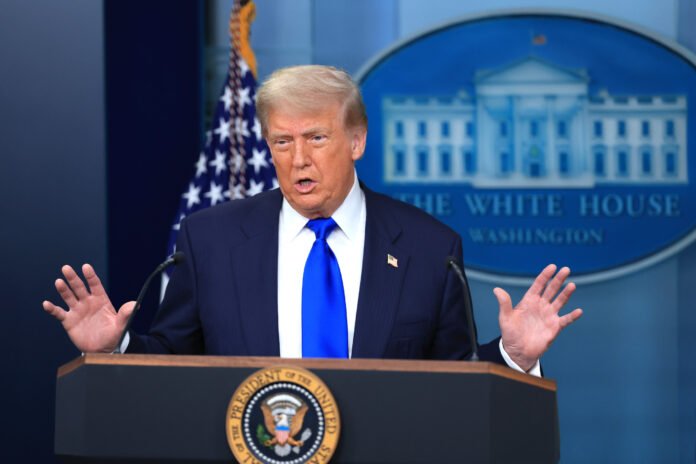Three days after comedian Stephen Colbert called Paramount‘s $16 million settlement with President Donald Trump “a big fat bribe,” CBS canceled his top-rated late-night show. The timing wasn’t coincidental, it was calculated, and it represents the most brazen example yet of how Trump has weaponized presidential power to extract what amounts to total capitulation from corporate America.
Since his election victory, Trump has orchestrated the largest corporate shakedown in American history. Disney paid $15 million to settle a defamation case legal experts called frivolous. Meta handed over $25 million for suspending Trump’s social media accounts after January 6. Paramount paid $16 million over routine interview editing. Most audaciously, Trump has extracted nearly $1 billion in “pro bono” commitments from nine major law firms through executive orders that stripped security clearances and threatened to destroy their businesses.

Joe Raedle/Getty Images
The pattern is unmistakable. Trump targets companies with government leverage points, demands payment, and punishes those who resist. When CBS executives needed Federal Communications Commission approval for their $8 billion merger with Skydance Media—run by the son of Trump ally Larry Ellison—they paid the president’s demanded settlement. When Colbert publicly called it what it was, they silenced him permanently.
This isn’t capitalism. It’s an oligarchy.
The law firm shakedowns reveal the system’s true mechanics. Trump issued executive orders against firms like Paul Weiss and Perkins Coie, citing their representation of his critics or participation in investigations against him. Faced with losing security clearances, federal contracts, and access to government buildings, these firms capitulated with shocking speed. Paul Weiss agreed to $40 million in “pro bono” work. Skadden, Arps pledged $100 million. Additional firms each committed $125 million apiece.
These aren’t valid contracts but coerced payments extracted under duress. Yet corporate executives have calculated time and again that paying Trump’s tribute was cheaper than fighting.
The international parallels are chilling. President Vladimir Putin perfected this model with Russian oligarchs, using tax investigations and regulatory pressure to force compliance and extract wealth. President Recep Tayyip Erdogan seized businesses from perceived enemies in Turkey, forcing “donations” to state causes. Trump has simply refined the technique for American democracy, using executive orders and regulatory approval processes as leverage points.
What makes Trump’s approach particularly insidious is its veneer of legality. Unlike Putin’s crude asset seizures, Trump’s extortion operates through ostensibly voluntary settlements and pro bono commitments. Companies can claim they weren’t technically forced to pay—they just faced continued harassment if they didn’t. The payments flow to Trump’s presidential library or favored causes, creating plausible deniability while enriching his political infrastructure.
Corporate executives defend these payments as rational business decisions. They’re wrong. By normalizing presidential extortion, they’re destroying the rule of law that makes American capitalism possible. No business can operate successfully in a system where the president’s personal whims determine regulatory outcomes and government access.
The Colbert cancellation crystallizes the stakes. When a network cancels its most successful late-night host three days after he criticized their tribute payment to the president, the message is unmistakable: criticism of Trump will not be tolerated, regardless of ratings or revenue. CBS‘ transparently false claim that this was “purely financial” only emphasizes their capitulation’s brazenness.
Democratic senators are now investigating whether Skydance made additional commitments to Trump beyond the announced settlement. The Writers Guild has called for state prosecutors to examine potential bribery violations. But investigations move slowly, while Trump’s extortion machine operates in real time.
The business community’s response will define whether America remains a democratic republic or becomes a kleptocracy where presidential favor determines corporate survival. Every payment normalizes the system. Every capitulation invites the next demand.
Trump has made clear this is just the beginning. He’s boasted about putting law firms to work negotiating trade deals and suggested expanding his corporate pressure campaign. Having successfully extracted $1 billion through extortion, why would he stop?
Corporate America faces a choice: resist now, while democratic institutions still function, or accept permanent subordination to presidential whims. The cost of resistance keeps rising, but the cost of submission is democracy itself.
The oligarchy has arrived. The only question is whether anyone will fight it.
Nicholas Creel is an associate professor of business law at Georgia College & State University.
The views expressed in this article are the writer’s own.






